A letter of recommendation is a letter that highlights a person’s character traits and work ethic to help them in their application process. Usually, these letters come from people who have spent considerable time with the applicants in an academic or professional setting.
This letter for a student from a teacher describes a student’s qualifications, skills, qualities, and capabilities that make them the best fit for a given position, college, or graduate school program.
The student might use it to help them enter an academic program or start their career in a specific field. The purpose of it for a student is to provide universities or companies with a reference account of a candidate’s qualifications, including their unique skills, strengths, goals, and accomplishments.
Free Templates
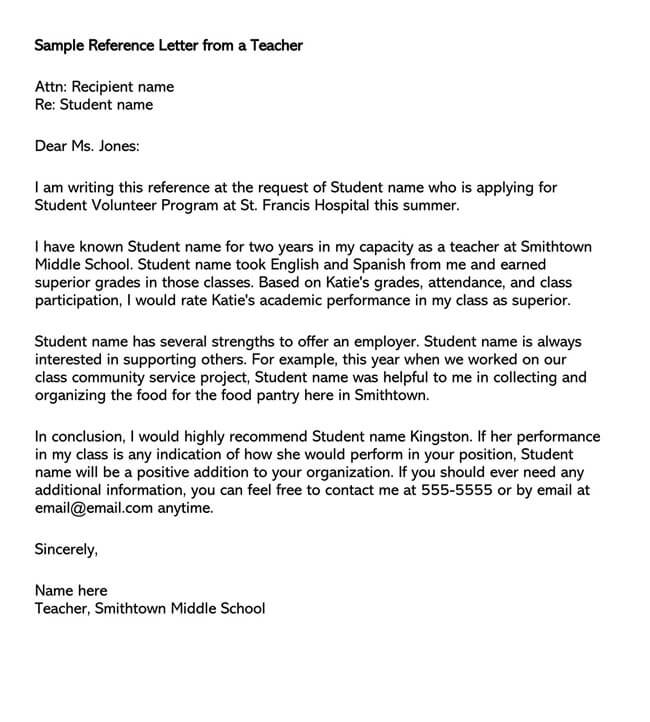
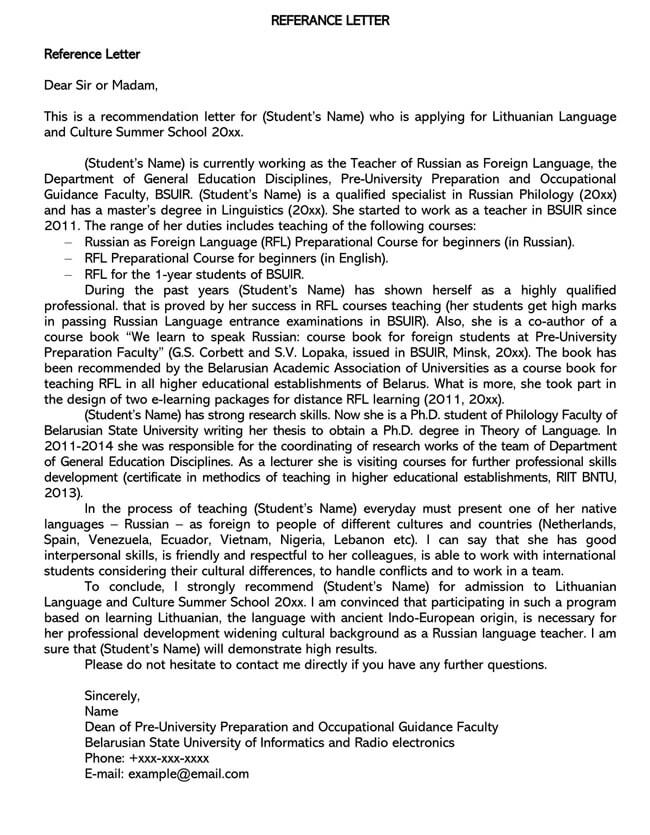
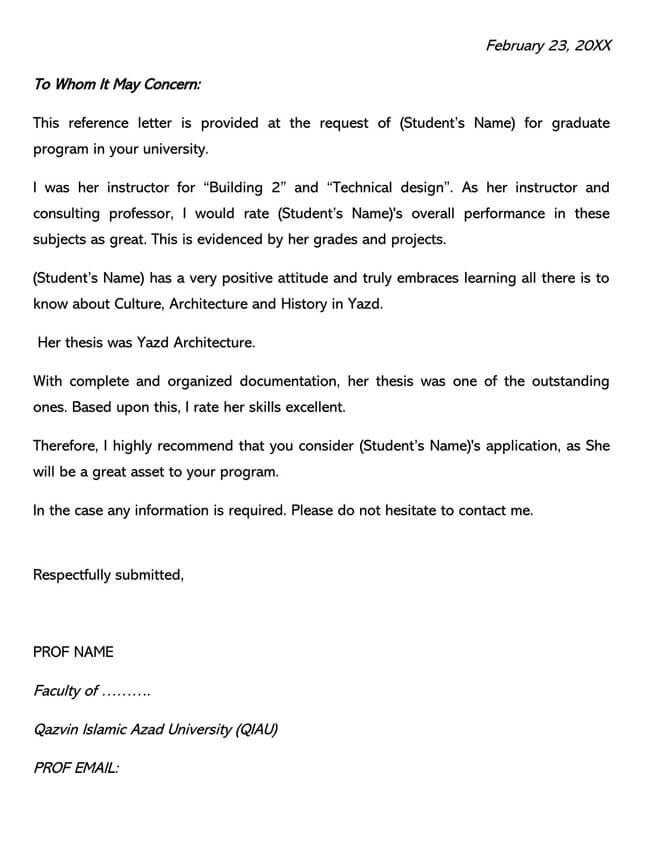
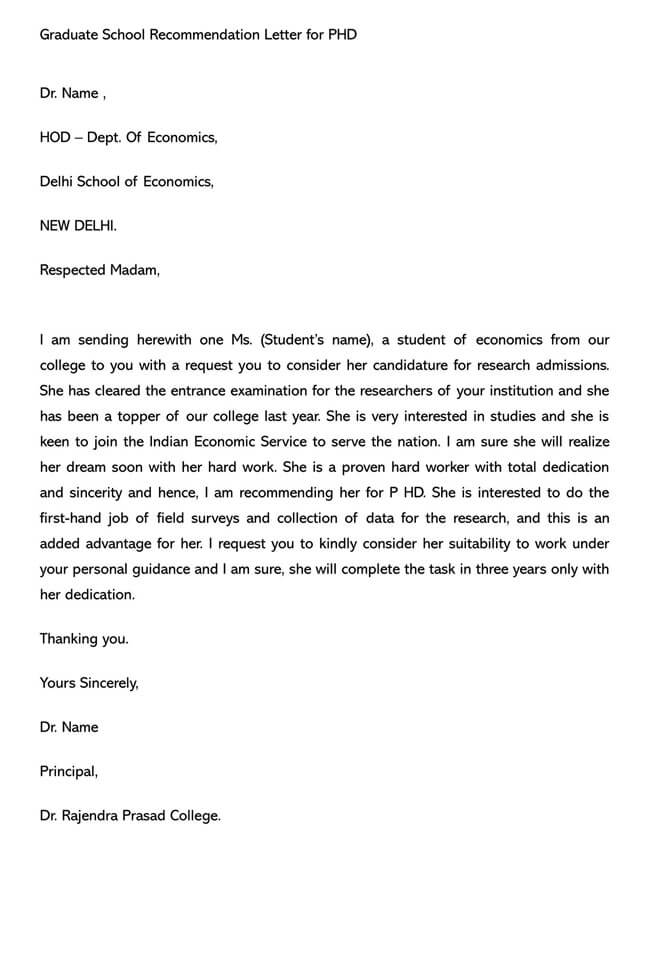

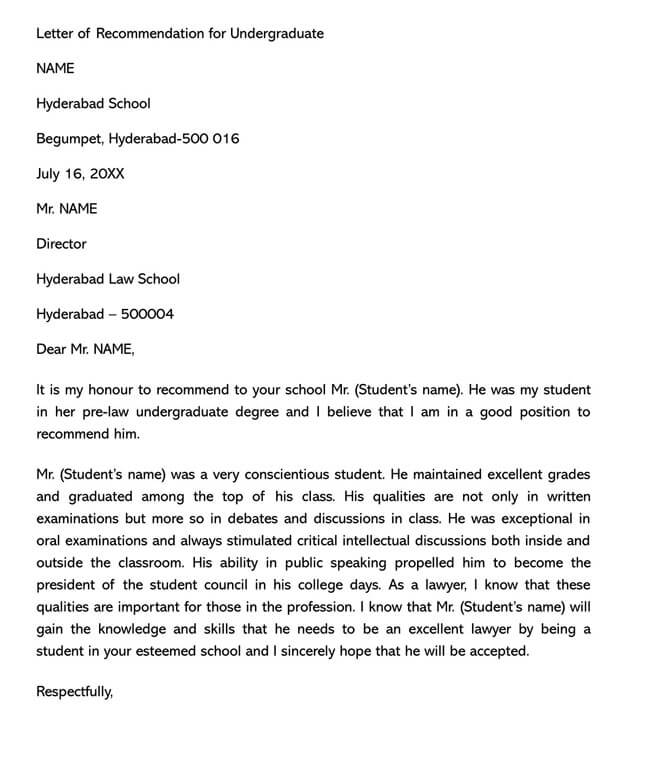
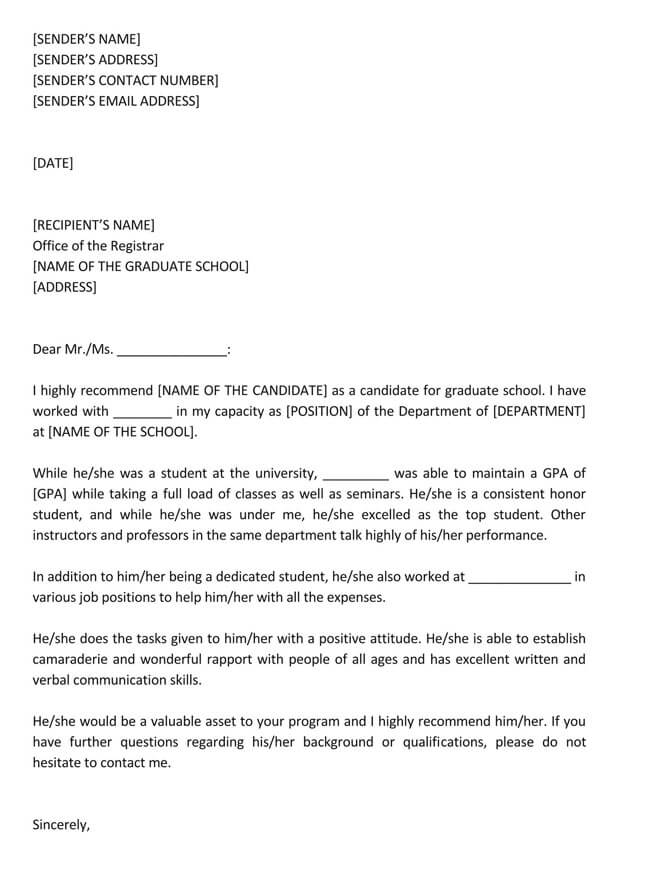
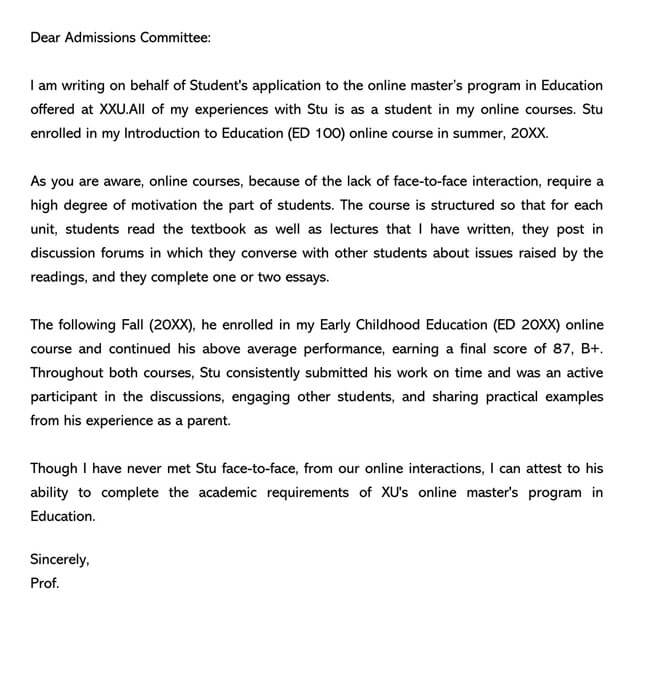
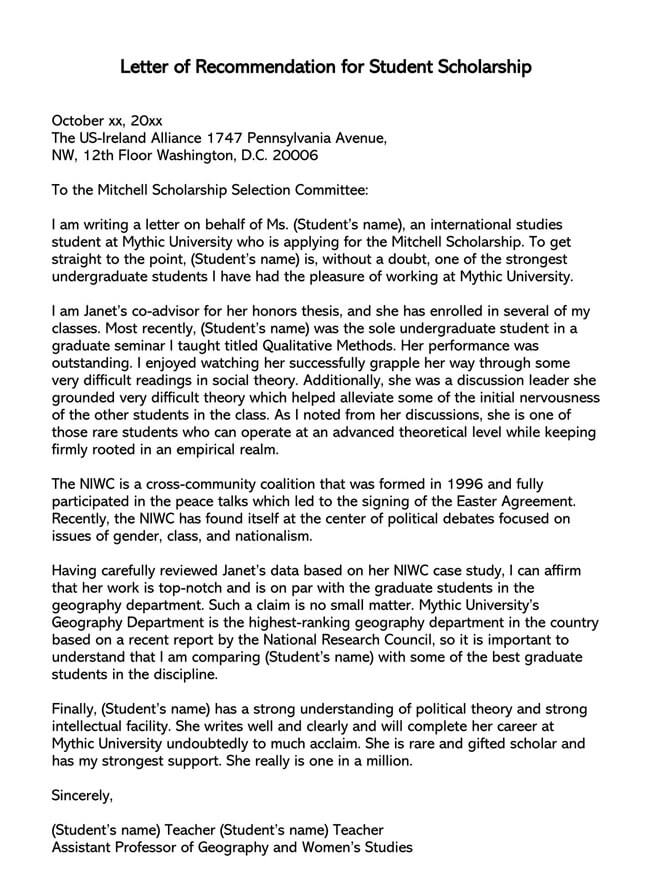
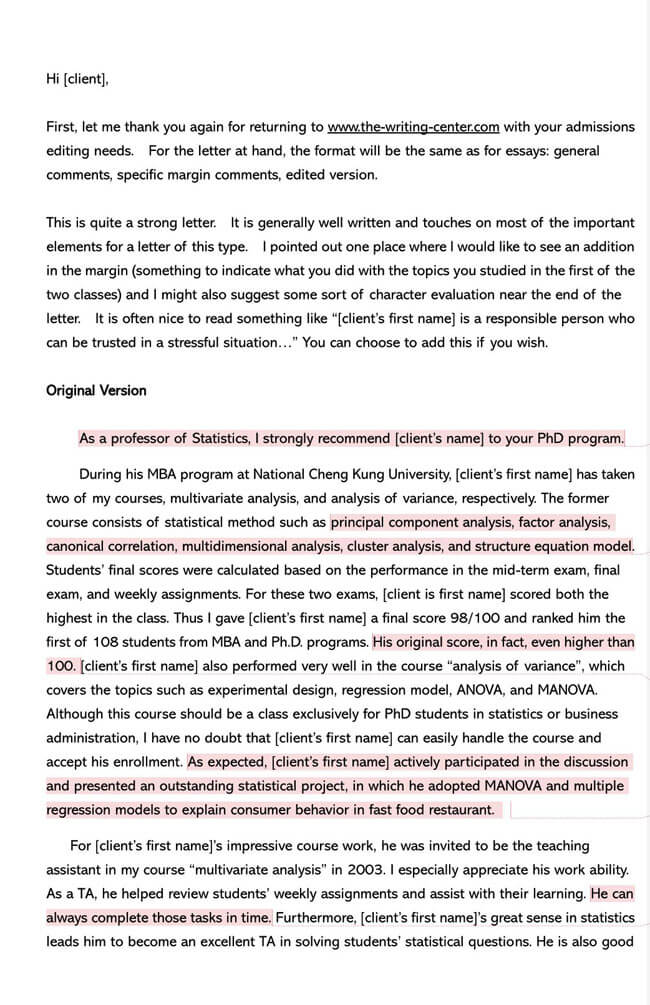
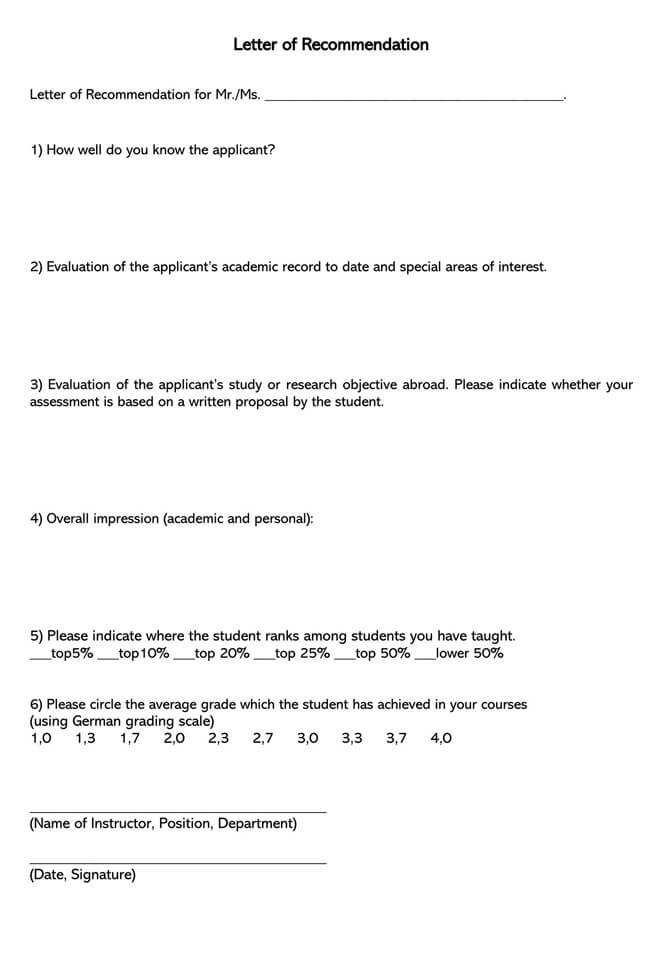
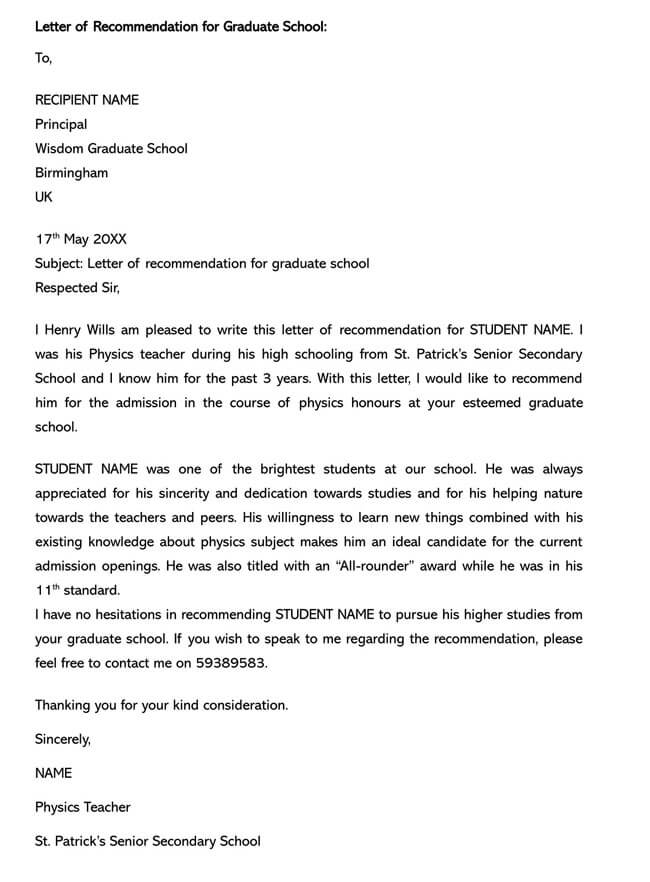
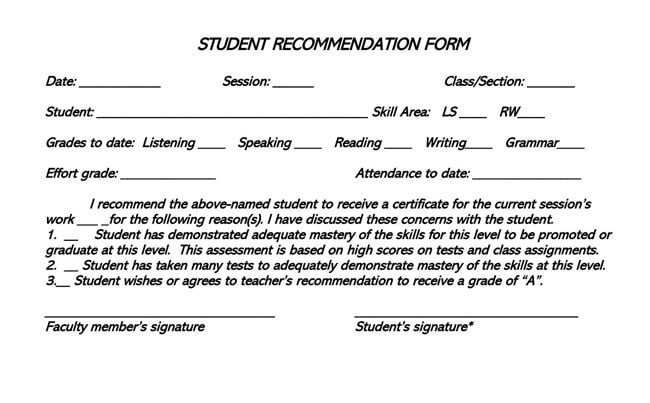
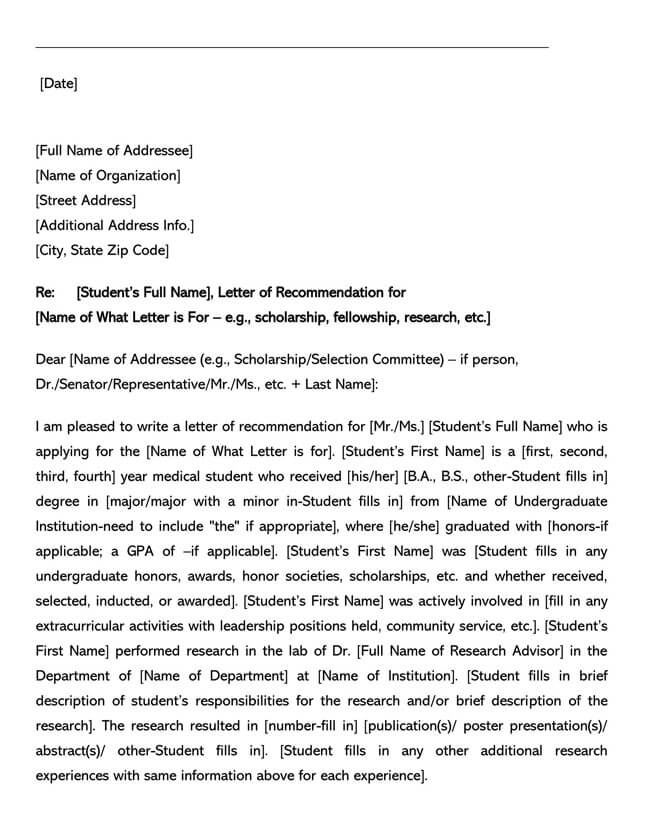
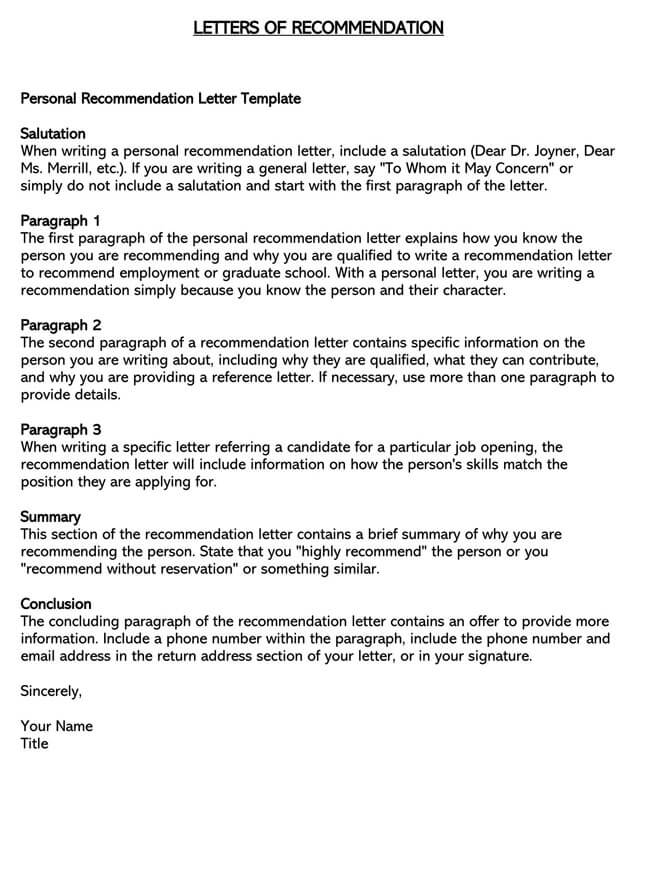
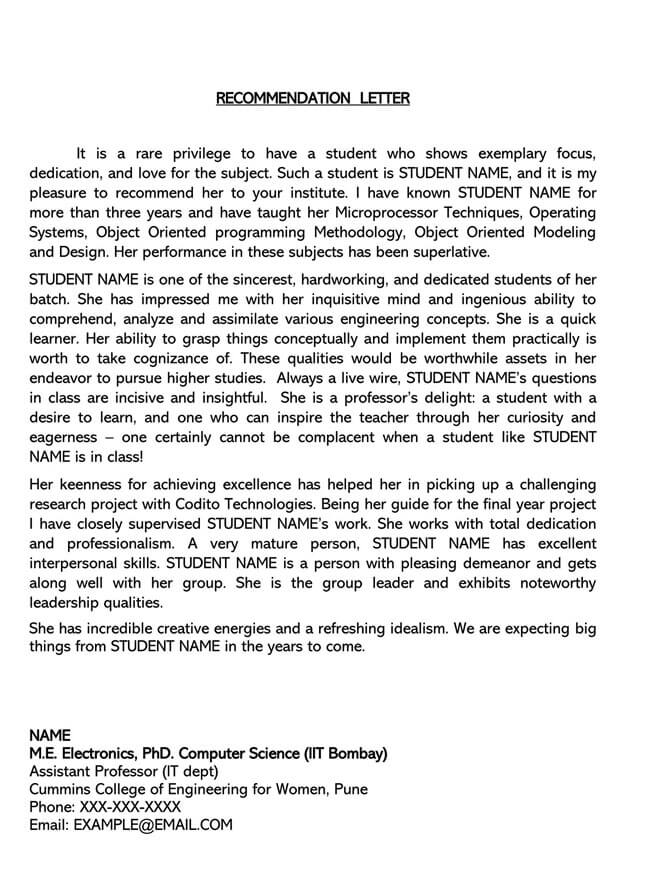
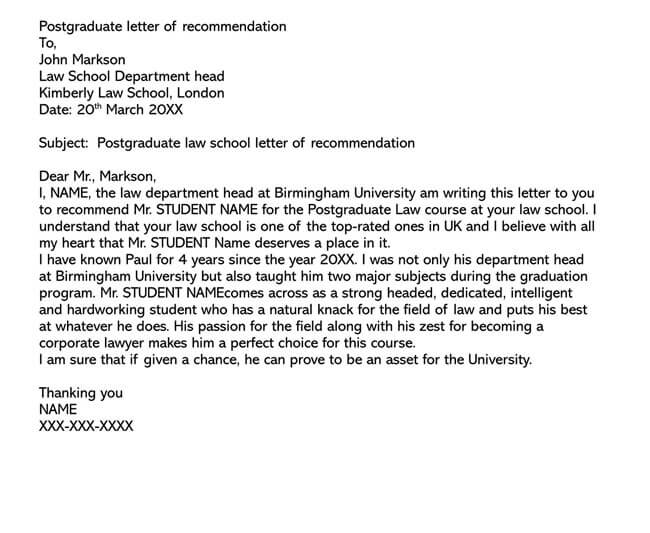
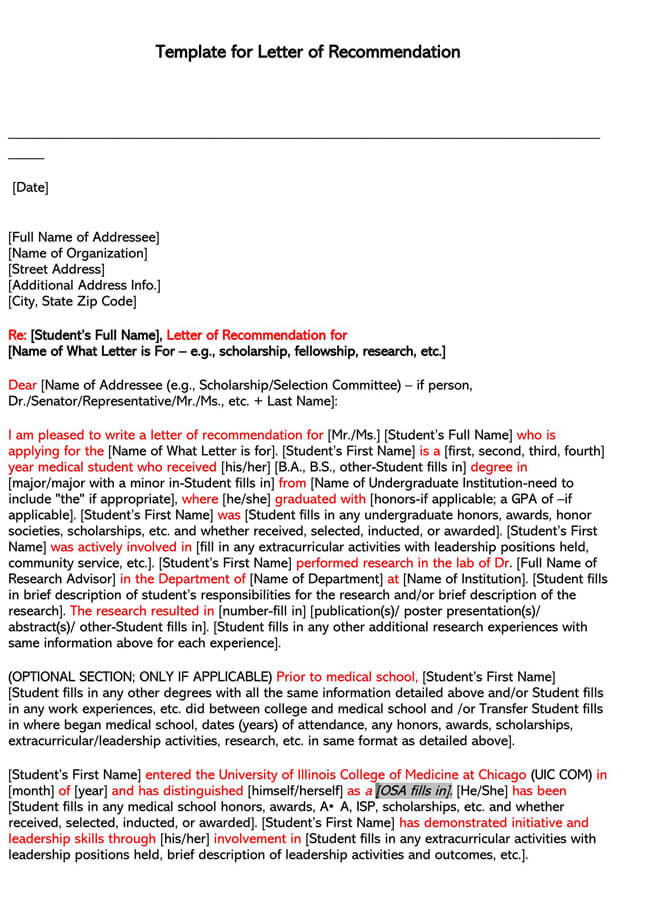
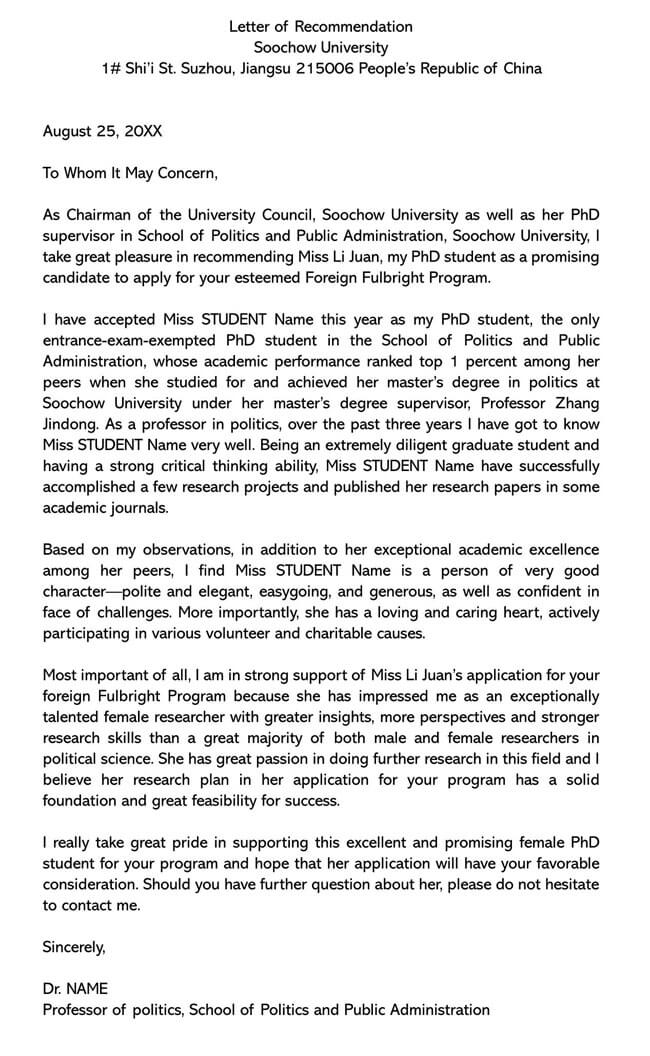
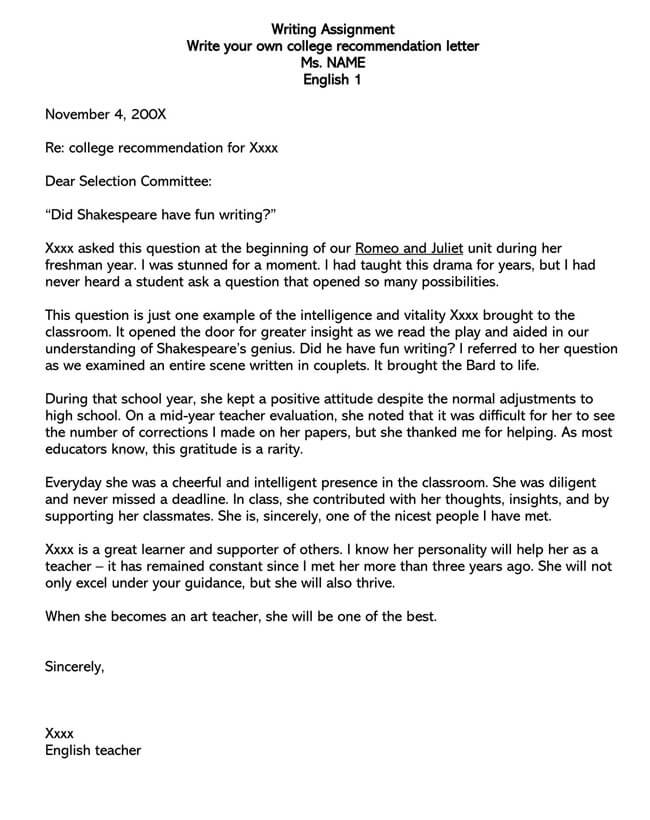
Information to Collect from the Student
To write it effectively for your student, you need to collect certain information from the student concerning the application.
This information includes:
- The deadline for submission of the letter
- The email and street address to which the letter should be sent
- The name of the organization or institution to which the student is applying to
- The job title and name of the person at the organization or institution who will be reviewing the student’s application documents
- The title and description of the position the student is applying for
- A list of the qualifications, skills, and accomplishments that the student feels will be required for the position they are applying for.
- The student’s resume (if applicable) or the essay they are likely to submit to the organization for review.
Writing the Recommendation Letter
It is crucial when a student applies to a higher educational institution or a job. When writing the letter, the teacher should provide a character witness to the institution or the organization on behalf of the student.
When writing a letter of recommendation for your student, the following guide will help you understand how to structure it and what components to include:
Know the student’s academic information
As a reference, you need to be aware of the student’s academic information, including their academic achievements, extracurricular activities, and GPA. Ask for information about the program, position, or college they are applying to. Knowing this information allows you to tailor the letter to the program or job the student is applying for and helps you advocate for them by highlighting their success story to help them stand out among other applicants.
Given that your student is applying for a position in a company, ask them to review their resume to understand their professional or academic background. Alternatively, you can ask for the role’s job description to identify how best the student can succeed in the role.
Pro Tip
If the student is seeking admission to a given college or university, ask to review the personal essay that they are likely to submit if it is ready.
Besides, you can schedule a meeting with your students and discuss why they are applying for the specific role or program, what they hope to achieve in the long run, and what they hope to gain from the opportunity. Once you have this information, you can include your perspective in the letter.
Address the letter accordingly
To make the letter seem more personalized to the reader and reach the intended audience, address it accordingly. Confirm with your student to whom the letter should be addressed, including the individual’s role in the application process. If the receiver is unknown to the student, address it to the company’s personnel department or the college’s admission office.
In a situation where the student is applying to several universities, colleges, or companies, then generalize the letter. However, it would be best to highlight the student’s suitable attributes concerning what they are applying for.
Introduce yourself
Start it by first introducing yourself credibly- who you are and why you are qualified to speak on the student’s behalf. This helps the admissions board or employer have a valued opinion about the student. While writing this section, include your job titles, such as the subject you teach or a specific course that you taught the student. You can also specify your role as a class teacher or coordinator of an extracurricular activity or club of which the student was an active member.
Include academic relationship details
The introduction section of the letter should also capture a detailed discussion of how long you have known the given student and in what capacity. This can be an extension of your job title, directly identifying your role in the student’s academic life. Alternatively, you can describe your first impressions of the student and how you have seen them grow and develop into the all-around student that they are currently. When writing this part, consider phrasing your student’s perspectives in terms of how they impressed you in the classroom, on their assignments, and on extracurricular activities, among other academic settings.
Highlight the student’s qualifications
Typically, organizations and educational institutions look for applicants they are convinced can contribute to and improve the organization. Employers may want to read the letter that outlines how the student can help grow their business and positively contribute to the company culture. Similarly, the admission counselor may be interested in knowing whether the student will join clubs and organizations or be actively involved in their education and assist their peers. Do the research and know who will be reading this letter for the student. Include specific examples and information about the student’s unique qualities and skills that will help benefit the company or university.
You can demonstrate the student’s potential success by showing their contributions to your school.
Tailor your specific examples from information drawn from their resume or academic information, including items such as;
- Academic brilliance, such as improved or maintained grades over time
- Presentations and public speaking opportunities
- Participation in leadership roles such as captain of a team, school, or president of a club
- Individual or group projects
- Competitions, awards, and recognitions
- Volunteering
- Clubs
- Sports
- Conclude your letter
The best way to conclude it is by restating the teacher’s support of the student’s academic qualifications and offering to remain available should the reader have more questions about the recommendation and experience with the student. You can achieve this by including a few options for the reader to contact you, including your phone number and your email address. This shows the university, college, or company that you believe in your student’s abilities and fully endorse them for the program they are applying for, which may influence their decision to select the student and go forward.
Template Recommendation Letter
[Teacher’s Name]
[Teacher’s Title/Position]
[School Name]
[School Address]
[City, State, Zip Code]
[Teacher’s Email Address]
[Teacher’s Phone Number]
[Date]
[Recipient’s Name or “To Whom It May Concern,” if the recipient is unknown]
[Recipient’s Title/Position, if known]
[Company/Organization/University Name]
[Address, if known]
[City, State, Zip Code]
Dear [Recipient’s Name or “To Whom It May Concern”],
I am writing to wholeheartedly recommend [Student’s Name] for [specific position, program, or opportunity] at [Company/Organization/University Name]. As [Student’s Name]’s [Subject] teacher for [duration] at [School Name], I have had the pleasure of witnessing firsthand [his/her/their] remarkable growth, both academically and personally. [Student’s Name] has consistently demonstrated exceptional qualities that I believe will make [him/her/them] an outstanding addition to your [team/program].
[Student’s Name] has excelled in [his/her/their] studies, particularly in [mention relevant subjects or areas of study], showcasing [his/her/their] keen intellect and dedication to learning. [He/She/They] possesses a deep understanding of [specific skills or knowledge relevant to the position or program], which is evident in [his/her/their] [specific projects, achievements, or contributions]. [Student’s Name]’s ability to think critically and solve complex problems is among the best I have seen in my [number of years] years of teaching.
Beyond [his/her/their] academic achievements, [Student’s Name] is a [mention personal qualities, e.g., natural leader, compassionate individual, etc.]. [He/She/They] has contributed significantly to our school community through [mention specific activities, roles, volunteer work, etc.], demonstrating [his/her/their] commitment to making a positive impact. [Student’s Name]’s [mention another quality or achievement] is particularly noteworthy, illustrating [his/her/their] [describe how this quality or achievement reflects the student’s character or abilities].
I am confident that [Student’s Name] is well-suited for [specific position or program] due to [his/her/their] [mention reasons related to skills, qualities, and potential]. [He/She/They] is not only capable of meeting the challenges that [he/she/they] will face but is also poised to make meaningful contributions that will exceed your expectations. [Student’s Name]’s passion for [mention relevant field, study, or interest] and [his/her/their] aspiration to [mention student’s goals or ambitions] are indicative of the significant potential that I am certain [he/she/they] will realize.
In conclusion, I offer my highest recommendation for [Student’s Name] without reservation. [He/She/They] will bring to your [team/program] a wealth of knowledge, a vibrant spirit, and an unwavering dedication to excellence. Should you require any further information or wish to discuss [Student’s Name]’s qualifications in more detail, please do not hesitate to contact me at [Teacher’s Phone Number] or via email at [Teacher’s Email Address].
Thank you for considering this recommendation. I am eager to see the contributions that [Student’s Name] will undoubtedly make to your [team/program] and look forward to [his/her/their] continued success.
Sincerely,
[Teacher’s Signature, if sending a hard copy]
[Teacher’s Name]
[Teacher’s Title/Position]
[School Name]
Professional Samples
Sample 01: Recommendation Letter for a Student Applying to a University
Dear Admissions Committee,
I am honored to recommend one of my most distinguished students, Sarah Chen, for admission to Columbia University’s English Literature program. As Sarah’s AP English Literature teacher for the past year at Lincoln High School, I have observed her profound analytical skills, exceptional writing ability, and passionate engagement with literature.
Sarah’s intellectual curiosity and dedication to exploring complex literary themes are truly remarkable. Her insightful analysis of “The Great Gatsby” not only demonstrated her ability to engage deeply with text but also her capacity to understand and articulate the nuanced interplay between historical context and literary expression. This work, among others, contributed to her earning a top grade in my class.
Beyond her academic prowess, Sarah has shown herself to be a leader and a compassionate community member. She served as the president of our school’s Literature Club, where she organized monthly book drives for underprivileged communities, showcasing her commitment to using literature as a tool for social change.
Sarah’s ambition to explore literature’s role in society aligns perfectly with Columbia University’s emphasis on fostering intellectual growth and civic engagement. I am confident that she will not only thrive in your program but also contribute significantly to your academic community.
Please feel free to contact me if you need further information or insights into Sarah’s achievements and character. I am enthusiastic about Sarah’s future and firmly believe that she will be an outstanding addition to Columbia University.
Sincerely,
Dr. Elizabeth Harmon
AP English Literature Teacher
Lincoln High School
e.harmon@lincolnhs.edu
(555) 321-9876
Sample 02: Recommendation Letter for a Student Applying for a Job
Dear Hiring Manager,
I am writing to wholeheartedly recommend Michael Johnson for the Junior Data Analyst position at Tech Innovations Inc. As Michael’s Mathematics teacher for the past two years at Westside High School, I have been consistently impressed by his exceptional numerical aptitude, analytical thinking, and dedication to solving complex problems.
Michael has consistently demonstrated his prowess in mathematics, particularly in statistics and calculus, areas that are fundamental to data analysis. His project on statistical models for predicting sports outcomes was not only awarded the top prize at our annual science fair but also showcased his ability to apply mathematical concepts to real-world situations.
Beyond his academic achievements, Michael possesses a remarkable work ethic and a collaborative spirit. He tutored his peers in advanced math courses, displaying not only his mastery of the subject matter but also his patience and ability to communicate complex ideas clearly.
Given Michael’s analytical skills, his passion for technology, and his eagerness to learn, I am confident that he will be a valuable asset to your team at Tech Innovations Inc. Michael is precisely the kind of motivated and talented individual who can contribute to your company’s success while growing professionally.
Please do not hesitate to contact me at t.rivera@westsidehs.org or (555) 654-3210 for any further information about Michael’s abilities and accomplishments. I am confident that Michael will exceed your expectations and make significant contributions to your projects.
Sincerely,
Mr. Thomas Rivera
Mathematics Teacher
Westside High School
Key Takeaways
These letters are effective samples for several reasons:
Personal Insight and Specific Examples: Both letters provide specific examples of the students’ achievements and characteristics, demonstrating the writers’ personal knowledge of the students. For instance, Sarah’s insightful analysis of “The Great Gatsby” and Michael’s project on statistical models showcase their skills and intellectual engagement.
Relevance to the Opportunity: Each letter tailors its content to match the opportunity the student is applying for, highlighting the qualities that make them ideal candidates for their respective paths. Sarah’s passion and engagement with literature are emphasized for her university application, while Michael’s analytical skills and mathematical prowess are highlighted for the job at Tech Innovations Inc.
Balanced Character and Academic/Professional Skills: Both letters balance the discussion of academic or professional skills with personal qualities. This provides a well-rounded picture of the students, illustrating not only their capabilities but also their character and potential to contribute to a community or workplace.
Professional and Supportive Tone: The letters are written in a professional tone, with clear expressions of strong support for the students. The use of phrases like “wholeheartedly recommend” and “exceptional numerical aptitude” conveys the writers’ confidence in the students’ abilities and their support for the students’ applications.
Open Invitation for Further Contact: Offering to provide further information or to discuss the students’ qualifications in more detail demonstrates the writers’ genuine support and provides an opportunity for the recipients to gain additional insights.
Clear Endorsement: Both letters end with a strong statement of endorsement, reaffirming the writers’ support and belief in the students’ suitability for the opportunity.
Overall, the effectiveness of these samples lies in their detailed and personalized approach, demonstrating a deep understanding of the students’ abilities and a strong commitment to supporting their future endeavors.
Professional Tips to Consider
As a teacher, when tasked with the responsibility of crafting such a letter for your student, consider these professional tips to come up with a positive and objective letter.
These include:
- Only write it for a student whose capabilities, skills, and qualifications you can speak to directly.
- Get submission details, such as the recipient’s name, email, and due date, from the student
- Ask your student to provide you with an updated copy of their resume and details about the specific opportunity for which they need a reference. Tailor the letter accordingly and include only the most relevant information.
- Include specific examples of the student’s relevant skills, qualities, experiences, and accomplishments that highlight how the student will positively contribute to the given institution’s growth and culture.
Final Thoughts
A letter of recommendation from a teacher is crucial when a student applies to a university or a job. It provides the institution’s admission department or the employer with a detailed account of the reference’s perspective on the student’s capabilities and accomplishments in their academic background.
Suppose a teacher writes an honest and positive letter of recommendation for a student. In that case, it can help them increase their chances of being selected for the role or program they are applying for against other competent applicants.When writing it, consider asking your student to provide you with a list of skills and qualifications that they believe are most important for the job or academic program to highlight them in the letter positively.












